#truth is simple
Text
💚💚💚
#Mold#bacteria#penicillin#health#health care#big pharma#scammers#corruption#diseases#truth#speak truth#seek truth#know truth#truth is freedom#truth is justice#truth is simple#truth always wins#wwg1wga#please share
19 notes
·
View notes
Text

Julia de Burgos, from Song of the Simple Truth: Poems; "That You Love Me In Green,"
#lit#julia de burgos#that you love me in green#poetry#love language#typography#song of the simple truth: poems#storm#p
13K notes
·
View notes
Text

"I love you, Zevran. I hope you know that."
"Yes... Yes, I know that."
— commission art by @sinizade, posted with permission
#***i want to clarify I commd this art from sinizade and this art is not my own!! please go follow them and comm them if you can!!#Something I commissioned in 2023 by the lovely sinizade! One of my fave pieces I've ever commissioned (still my background on my computers)#I could have gone for the classic 'In truth for the chance to be at your side I would storm the Dark City itself. Never doubt it' quote#which is honestly why this has been sitting in my drafts for so long. but this quoate is so simple and soft... i love it. and i love them!#anyways i too have the DAtV fever so ill be resharing some comms I've had done over the years :)#zevran#zevran arainai#zevran x warden#zevran x aeducan#warden aeducan#aeducan#da oc — riryn aeducan#also yes the ref is from tangled im not ashamed#dragon age#dragon age origins#commissioned art
1K notes
·
View notes
Text
look
look at his smile
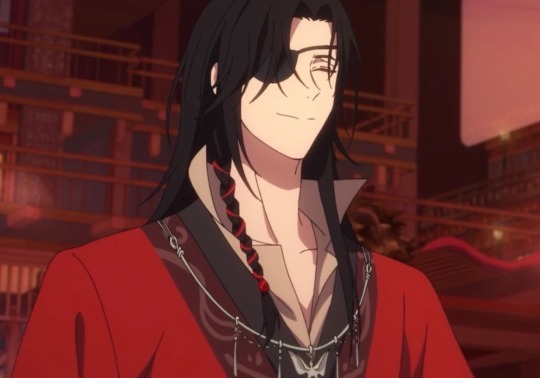
this gentle, innocent smile
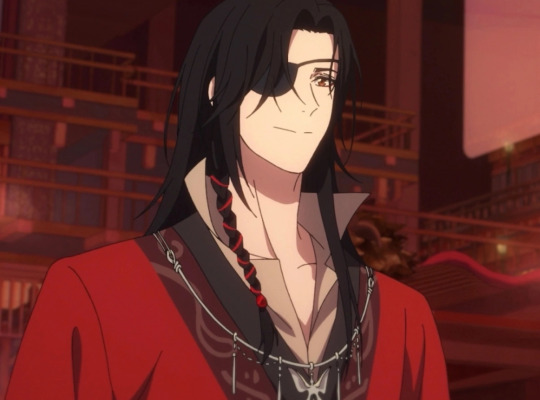
so unbelievably happy and relieved to see Xie Lian after all those years, alive and well
gods, that’s why i love donghua so MUCH
because THIS IS THE LOOK you’d have after 800 years of devotion, of searching, hoping, longing, loving
they don’t try to make him aloof and sexy in that yaoi-seme kinda way
they just make him TRUE
#and his truth is simple#just love#i swear to god i will cry#oh the next episode the ring and the eming will end me#heaven officials blessing#tian guan ci fu#tgcf#tgcf analysis#tgcf donghua#tgcf season 2#hualian#xie lian#hua cheng#tgcf thoughts#tgcf screaming#good tag
1K notes
·
View notes
Text
Have you ever noticed how Vessel has never actually said the words "I love you"? Like. He says it many, many times - each breath he takes is a confession - but he has never said it.
It's always "my love is / as (...)", "I'm full of the love you want", "like lovers", "your love", "(...) falling in love with me". The closest we get is "I made loving you (...)". Which still isn't quite the same as saying I love you.
It's almost like he needs to put some sort of barrier between what he feels and what he knows it's the truth to lessen the blow. Because he does love them, and will continue to do so, forevermore. No matter the cost of rain, through death. He's theirs unconditionally, even if it hurts him, right?
But they don't feel the same. He knows that. He begs for it, for them to fall for him, to take a bite, show him what it's like.
Vessel knows that they want his love, companionship, worship, whatever you want to call it, the way a wolf wants its prey. He knows that they keep him around, keep pretending to be falling in love with him, merely as play thing, a means to an end. He knows all of this and keeps loving anyway, knowing that his love doesn't matter.
You don't really love,
you just hate to be alone.
Because hiding behind big, fancy, flourished phrases like "I'll live like I've got missing limbs for you", and "My arms belong around you", and "We go beyond the farthest reaches", and -
And you know I'll be yours
Just want to be worth it
I will run like the wind till you follow me again
- is much easier than to admit the very simple and pathetic three-worded truth, knowing it is not reciprocated. Not anymore at least (if ever).
If what they say is "Nothing is forever", then what makes love the exception?
#guess who had a bout of insomnia and got hella sad and yearning 👍#augh. friends gather round. we aching together#highly doubt it'll ever happen but if he ever says “i love you” i will exit this plane of existence#Vessel hiding cold simple truths behind layers of sugar coating and vague metaphors will forever be my favourite thing#homeboy looks tough and spooky but really he's just a sad little wet cat quaking in his tabis 🥺#anyways. hi everyone 🙂✌️#sleep token#sleep token lore#darya is unhinged
370 notes
·
View notes
Text
no fear

one fear
#in truth: many fears#midst#midst podcast#midst spoilers#I mean not REALLY spoilers because it’s just the icons. but anyway#also: silly me thinking this would be as simple as taking screenshots on my phone. NOT SO. the text and icons DID NOT line up
244 notes
·
View notes
Text
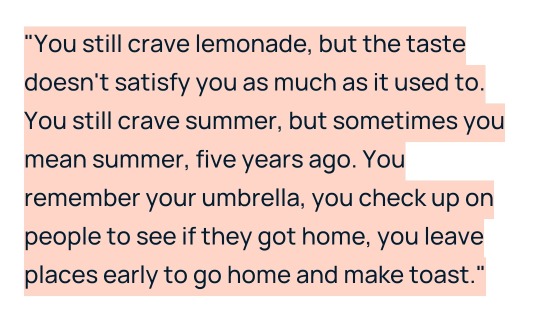
– Alida Nugent, "You Don't Have to Like Me: Essays on Growing Up, Speaking Out, and Finding Feminism"
[TEXT ID: "You still crave lemonade, but the taste doesn’t satisfy you as much as it used to. You still crave summer, but sometimes you mean summer, five years ago. You remember your umbrella, you check up on people to see if they got home, you leave places early to go home and make toast." END ID]
#the whole paragraph makes me cry#it's just a simple yet the most painful truth#classic literature#books and literature#literature quotes#quotations#words#excerpts#fragments#alida nugent#text posts
1K notes
·
View notes
Text
and i repeat myself happy birthday to silver fox sirius black you’re having breakfast with your husband and all of your family (including your grandkids) are gonna come to your house with a big fuck ass cake with the number 64 on it and they are singing happy birthday to you and remus kisses you and you blow the candles and you are a fucking sexy (and alive) old man
#as it was#because this is not an ‘as it should have been situation’#as this is the simple truth#sirius black
533 notes
·
View notes
Text
Speaking of the social context of P&P and Austen in general, and also just literature of that era, I'm always interested in how things like precisely formulated hierarchies of precedence and tables of ranked social classes interact with the more complex and nuanced details of class-based status and consequence on a pragmatic day-to-day level. I remembered reading a social historian discussing the pragmatics of class wrt eighteenth-century English life many years ago and finally tracked down the source:
"In spite of the number of people who got their living from manufacture or trade, fundamentally it was a society in which the ownership of land alone conveyed social prestige and full political rights. ... The apex of this society was the nobility. In the eyes of the Law only members of the House of Lords, the peerage in the strictest use of the word, were a class apart, enjoying special privileges and composing one of the estates of the realm. Their families were commoners: even the eldest sons of peers could sit in the House of Commons. It was therefore in the social rather than in the legal sense of the word that English society was a class society. Before the law all English people except the peers were in theory equal. Legal concept and social practice were, however, very different. When men spoke of the nobility, they meant the sons and daughters, the brothers and sisters, the uncles and aunts and cousins of the peers. They were an extremely influential and wealthy group.
"The peers and their near relations almost monopolized high political office. From these great families came the wealthiest Church dignitaries, the higher ranks in the army and navy. Many of them found a career in law; some even did not disdain the money to be made in trade. What gave this class its particular importance in the political life of the day was the way in which it was organized on a basis of family and connection ... in eighteenth-century politics men rarely acted as isolated individuals. A man came into Parliament supported by his friends and relations who expected, in return for this support, that he would further their interests to the extent of his parliamentary influence.
"Next in both political and social importance came the gentry. Again it is not easy to define exactly who were covered by this term. The Law knew nothing of gentle birth but Society recognized it. Like the nobility this group too was as a class closely connected with land. Indeed, the border line between the two classes is at times almost impossible to define ... Often these men are described as the squirearchy, this term being used to cover the major landowning families in every county who were not connected by birth with the aristocracy. Between them and the local nobility there was often considerable jealousy. The country gentleman considered himself well qualified to manage the affairs of his county without aristocratic interference.
"...The next great layer in society is perhaps best described the contemporary term 'the Middling Sort'. As with all eighteenth-century groups it is difficult to draw a clear line of demarcation between them and their social superiors and inferiors. No economic line is possible, for a man with no pretensions to gentility might well be more prosperous than many a small squire. There was even on the fringe between the two classes some overlapping of activities ... The ambitious upstart who bought an estate and spent his income as a gentleman, might be either cold-shouldered by his better-born neighbours or treated by them with a certain contemptuous politeness. If however his daughters were presentable and well dowered, and if his sons received the education considered suitable for gentlemen, the next generation would see the obliteration of whatever distinction still remained. The solid mass of the middling sort had however no such aspirations, or considered them beyond their reach.
"...This term [the poor] was widely used to designate the great mass of the manual workers. Within their ranks differences of income and of outlook were as varied as those that characterized the middle class. Once again the line of demarcation is hard to draw..."
—Dorothy Marshall, Eighteenth Century England (29-34)
(There's plenty more interesting information in the full chapter, especially regarding "the poor," and the chapter itself is contracted from a lengthier version published earlier.)
#anghraine babbles#long post#dorothy marshall#eighteenth century england#austen blogging#eighteenth century blogging#also thinking about this in terms of elizabeth spending so much of pride and prejudice /acutely/ conscious of a social divide#between her family (as in the bennets and mr collins) and darcy's status - so her claim to equality with him w/ lady catherine is- well#not a dry sociological statement but an important character moment for elizabeth (and lady catherine!)#realistically darcy's lifestyle politics and interests ARE far more allied with ppl like the fitzwilliams than ppl like the bennets#and elizabeth is not at all ignorant of that - it's why she initially thinks he's too much of a great man to be interested in her#even before she knows of his close connections to literal nobility#and that is probably the more ... normative? understanding of their respective positions.#so her later claim to equality with him - in a way that forces ly c to acknowledge elizabeth's own status - is not a simple neutral truth#but weighted in a way that's important thematically and for elizabeth's development - something that the pure sociological take misses imo#anghraine's meta#austen fanwank#sorta
152 notes
·
View notes
Text
"Stop antagonizing the fucking Bad Kids."
It was Jace's words that really doomed all the Rat Grinders. Now they get to be like Dayne and Penelope, unimportant and unceremoniously murdered. Antagonists with little screen time. Easy for the Bad Kids to hate, impossible to pity.
If Jace hadn't said that, they might have been Like Aelwyn and Ragh. Constant thorns in the Bad Kids' sides, there for so long that it would stop hurting. For so long that the Bad Kids would actually want to understand why they were there, and get invested.
#fhjy spoilers#fhjy#fantasy high#and even then! fig and kristen both wanted to help their respective rat grinders#but there wasn't enough time before the final battle because of jace telling them all to stay away#so they have to give up trying to redeem them or else get killed in this fight#i was pretty happy with their deaths but i feel bad for fans that got attached to them#but the simple truth is that the stress of junior year meant the bad kids barely got to interact with each other#let alone the people actively working against them#fantasy high junior year
348 notes
·
View notes
Text
I just cannot fathom how hated J.K. Rowling is online, especially on this app, all because she said that sex is real and that men don’t belong in women’s spaces. Y’all are utter lunatics for that. What she said is a truth that is known in both the past and present and will continue to be known into the future. You cannot change the truth just because it offends your delusions.
Get out of your little imaginary online bubbles and take a moment to breathe the fresh air outside, you people need it!
#how does this affect me personally what someone does with their own body?#look around babe#you have poisoned the minds of entire generation to reject SIMPLE biological and moral truths#mere children who do not have the ability to FULLY COMPREHEND their choices#are mutilating their healthy and growing bodies#madness#i stand with jk rowling#no one hates you either or wants you dead#I’ve seen that argument many times#you are being fed delusional lies#think for yourself for once!#don’t listen to what people tell you online#THINK!#use your brain
128 notes
·
View notes
Text
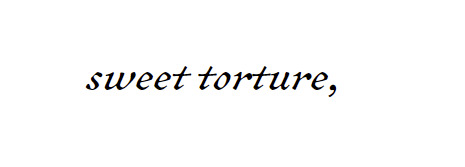
Julia de Burgos, from Song of the Simple Truth: Poems; "Perpetually Sleepless,"
894 notes
·
View notes
Text
So. What's the opposite of a sacrifice?
With the final episode looming it's a question we've been turning in our heads, so I wanted to give my best guess/analysis as to what it might be before Jon and Muna come to tear our hearts out in the final episode.
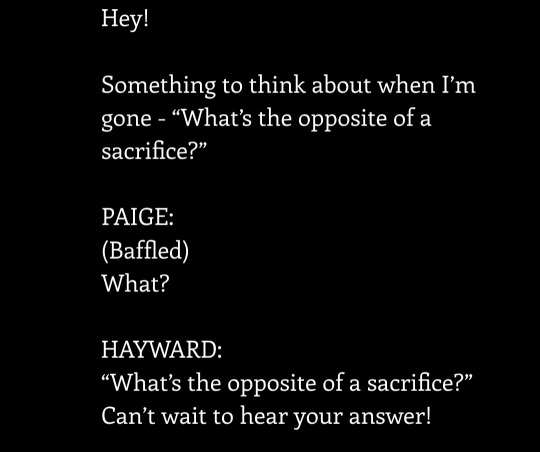
This is the question Hayward asks Paige, and later Carpenter, and it seems to be the underlying thematic statement of the series, in response to Carpenter's exposition in the first episode of the Silt Verses that introduces us to the fundamentals of the world and system they live in:
CARPENTER:
A god must feed.
A god must be fed.
This is a fact agreed upon across every territory in the Peninsula. And so, really, the only difference between the people born to the water and the people born to the land...
...is the precise nature of the sacrifice we need to make.
There is a God for anything in their world as long as there is someone believing in it. But all Gods need human sacrifices. A god must feed. A god must be fed.
These simple rules have been used as fascinating and horrifying metaphors of our modern society, and to explore themes of faith and sacrifice throughout the story.
And so the final question the last season proposes is if we can find a way to make something better, that can exist outside of this ultimately unsustainable exploitative system and the harm it inflicts upon ourselves and the world, when it has come to define so much of the way we live and how we think. And that means figuring out the opposite of a sacrifice, if they want to kill the idea, the lie, that is at the heart of their world.
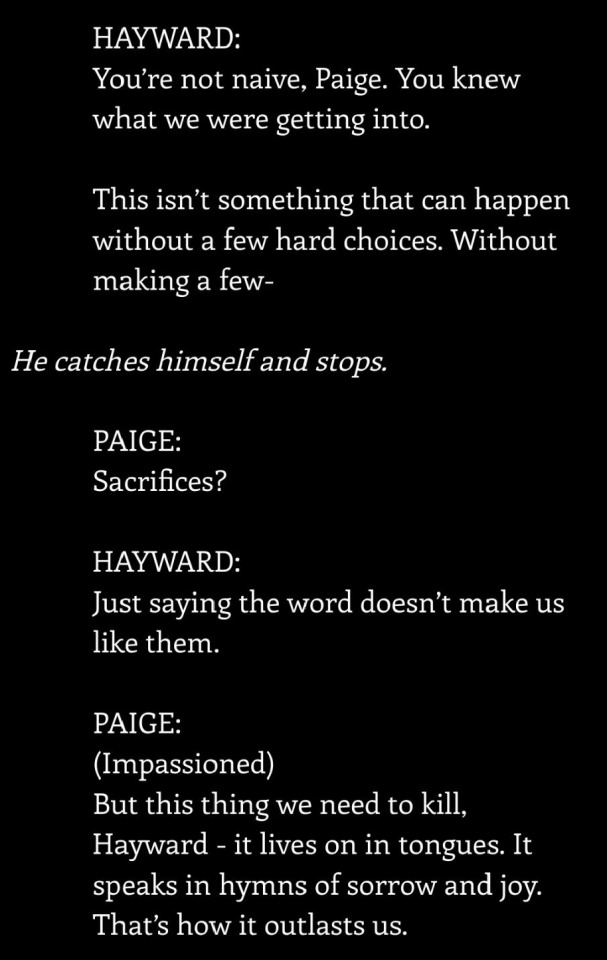
At first I thought the opposite of a sacrifice, of offering up to the gods, was about killing your gods. Starving them out. Refusing to offer up anything. And that is part of it, I think. I mean it's literally been a repeating mantra of multiple characters this season once they've reached they're breaking points. Violence in revolution as a tool to overthrow oppresive systems is sometimes needed and necessary. But what about after? What kind of future or vision for a better world can there be? There needs to be something at the heart of that movement that isn't just about violence against their opressors, because you then define yourself in relation to them.
This is even illustrated in the Many Below god Paige created having predator and prey emeshed together, a movement defined by their resistance against the predators of the world, the beasts, cannot seperate themselves to meaningfully create a better future that exists outside of that dichotomy. I think Hayward realises that even earlier in S2:
HAYWARD:
There’s a hare in the grass, half-buried and bloodied.
A barn owl has latched onto its back, its talons driving deep into the flesh of the hare.
Both animals are dead.
Familiar black stone veins protrude from the carcass of the victim, twisting like branches, driving upwards into the predator’s skin.
Hare and owl are locked together, inseparably.
The god must have struck just as the prey died.
White crocus is flowering up from the two entwined bodies.
(Unhappily)
And suddenly I begin to feel deeply afraid.
It all makes me think of a dormouse, dead in the dirt, its ribs showing. Of rabbits, teeth chattering, hungering from their cages
I kick dust up over the corpses. Nudge them aside into the long grass so they can’t be seen from the path.
Paige doesn’t need to know about this, I tell myself.
There’s no sense in worrying her. Not yet.
Which then makes sense why he's the one proposing the question of what the opposite of a sacrifice is to Paige (and Carpenter), for this very reason.
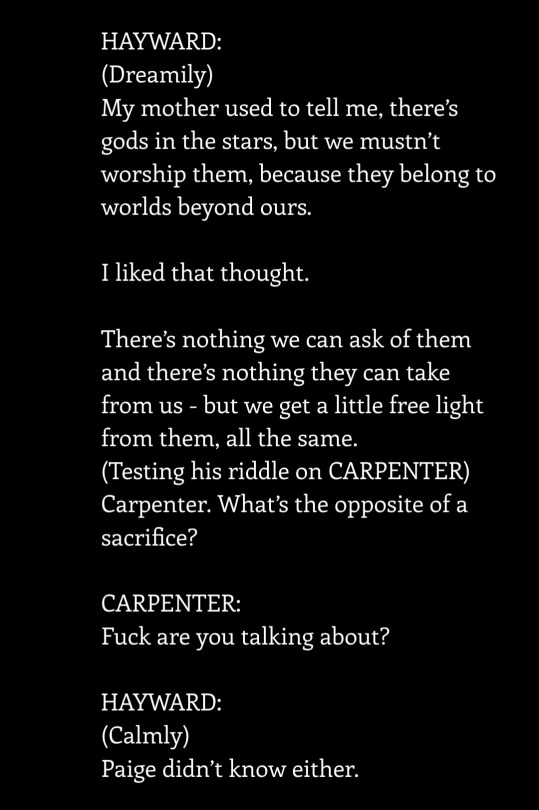
I think the answer is pretty simple and yet, like most simple truths in this world, it's forgotten and overlooked or twisted as naïve.
Preservation. The opposite of a sacrifice is preservation. To better explain this let me use an example:
If someone who cared about you tells you you're working too hard at your thankless job, sacrificing your sleep, your time, your personal relationships, your physical and mental wellbeing, far past the point considered sane, they'd tell you to stop. To make sure you take care of yourself. Instead of endlessly feeding yourself into a machine to justify your existence.
Applied to the world of the Silt Verses, it's not just self preservation and caring for yourself. It's about caring for, protecting, and preserving the lives of those around you, that is the ultimate act of rebellion and political warfare, the first steps forward towards a better world. Caring for humanity.
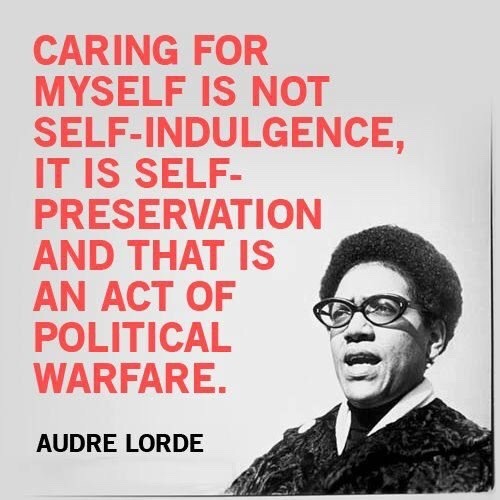
Whenever our characters reach a breaking point of turning against their gods, there's a common thread of wanting to save their fellow man, and realising the inadequacy of a god's ability to do that. Whether that's somebody close to them (like Faulkner and Paige):

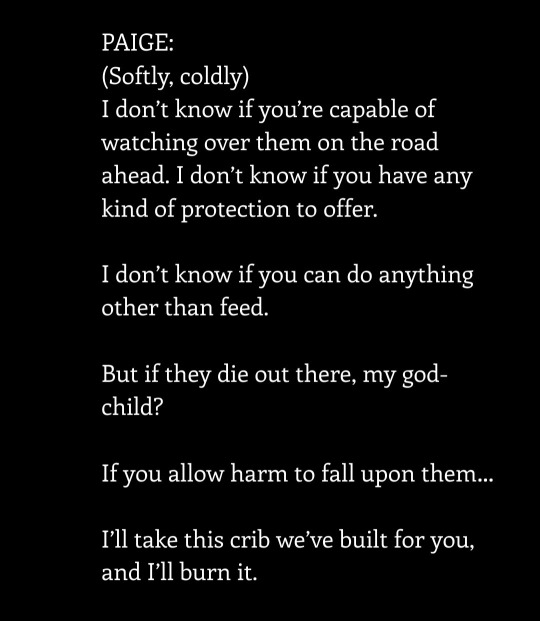
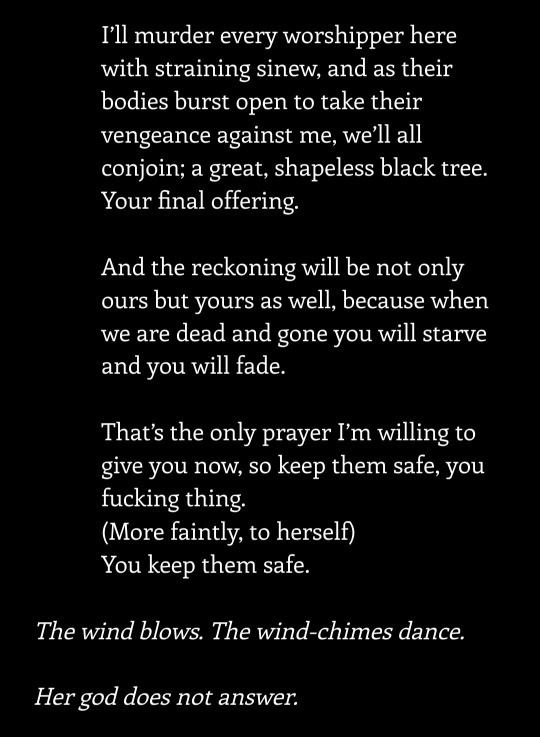
Or humanity as a whole (VAL and Shrue):
SHRUE:
Use them, pass them on, do not forget the suffering that keeps the engines of this world turning, forget the name of your god and cherish the name of your neighbour that was swallowed up by it-
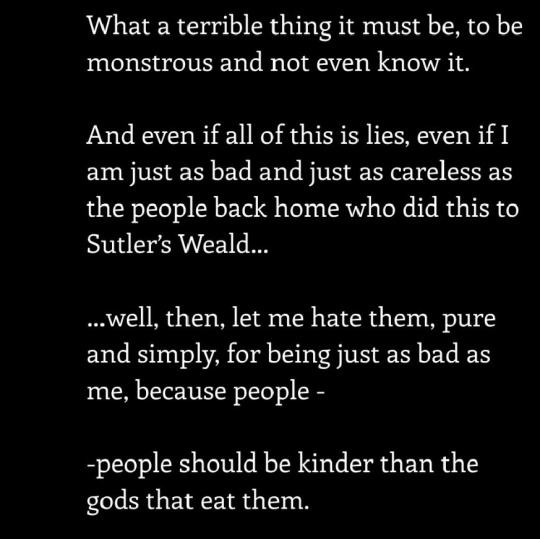
Cherish your neighbour. Be kinder to one another.
This can even go back to Carpenter's rejection of the Trawler-Man back in S1, her fury at the fact those she loved had been eaten (her family) and would continue to be eaten (Faulkner).
CARPENTER:
(Yelling to the river)
It's over between us, you twin mouthed prick!
Do you hear me?
Does that stir you from your torpor? Pry the barnacles loose from your sodden ears?
My father and mother were Gregory and Sandra Glass. My grandmother was Adalina Glass. My brother was Em.
They died for you.
Every single one of them died for you and they thought it meant something.
My name is Carpenter. And I am still alive!
I have loved you for so long. I have tried to know you for so, so much longer.
And I'm done with you. Here and now. I'm not laying down my life for you.
I'm not dying, do you hear?
The same breaking point for Faulkner at turning against his parish and finally snapping is the idea of Carpenter being offered as a sacrifice, an offering returned, begging for her to live.
I must clarify this is my own interpretation of the question and themes the story proposes. I'm
I'm not sure we'll actually get a hard answer so much as different characters offering their own answers and us as the audience encouraged to think for ourselves what it might be. I think this is what Hayward's answer might be at least, anyway, because like me he's a corny motherfucker:
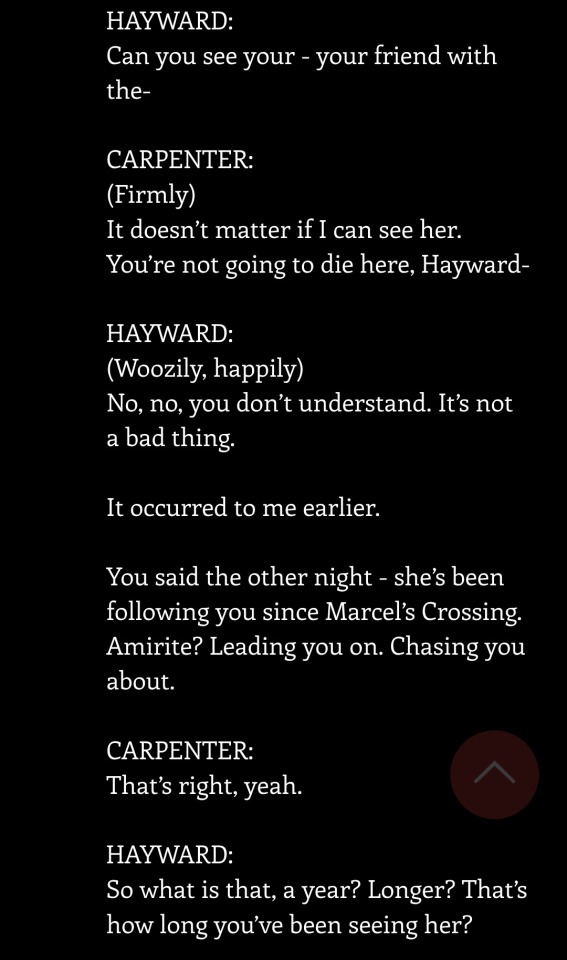
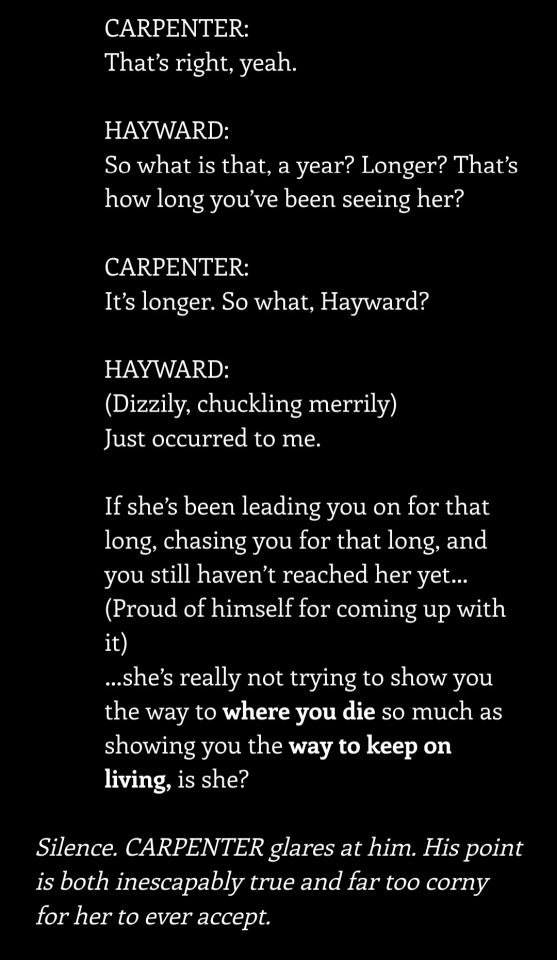
If a sacrifice is the idea that the most meaningful and transformative thing you can do is to give up your life, your sense of self, to die, then the opposite of that would be to try to keep on living, and finding meaning and transformation in that, surely?
#IT'S ABOUT FINDING A WAY TO KEEP ON LIVING#AND REACHING OUT TO HELP OTHERS DO THE SAME!#PRESERVATION!#CARING FOR EACH OTHER!#IN ALL THE COMPLICATED FUCK UPS AND MESS OF HUMANITY#AND ABSOLUTE ABSURDITY OF THE WORLD#THE SIMPLE TRUTH IS THAT OTHER PEOPLE ARE STILL ALL THERE IS!#the silt verses#tsv#tsv spoilers#tsv meta#tsv theories#not super satisfied with how I wrote thos but I also wanted to get it out before the finale comes to beat me up#sister carpenter#brother faulkner#paige duplass#adjudicator shrue#val the silt verses#it'll be bittersweet and tragic but I still believe they'll be hope at the end#however small#james hayward
117 notes
·
View notes
Text



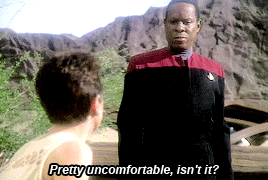
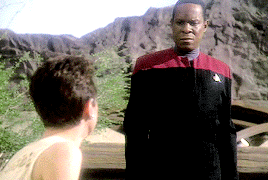
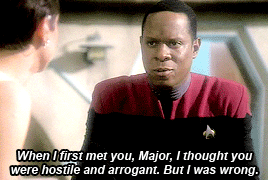
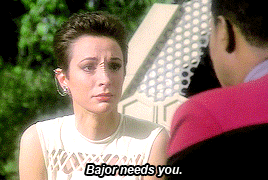
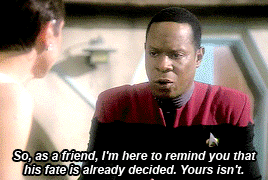
#tv: star trek: deep space nine#ds9edit#trekedit#benjamin sisko#kira nerys#kira nerys is so important guys#great scene#it's such an important one for their relationship#him admitting that he was wrong about her#and now that he knows her and considers her a friend#he needs to tell her the truth#and also it's an important scene for the themes of the show#things are not simple on this show#they are not straight-forward#and sometimes the choices are going to suck#but you have to make them anyway#things i made
233 notes
·
View notes
Text
i just read with my own two eyes a person saying that portraying women as strong in fiction is dangerous because it will lead little girls into thinking they can be stronger than men and that can hurt them in the long run because she never will be. this is a person that calls themselves a feminist
#feminism is when men strong and women dumb#terfism ruined feminism im sorry but it's the truth#bioessentialism is ruining feminism#simple as that#insane#crying#oh my god#i have the screenshots to prove it btw#mine#personal#not to be taken seriously#vent#cw discourse#discourse
310 notes
·
View notes
Text
"When you start to know someone, all their physical characteristics start to disappear. You begin to dwell in their energy, recognize the scent of their skin. You see only the essence of the person, not the shell. That's why you can't fall in love with beauty. You can lust after it, be infatuated by it, want to own it. You can love it with your eyes and your body but not your heart. And that's why, when you really connect with a person's inner self, any physical imperfections disappear, become irrelevant."
– Lisa Unger
#from my own experience this is a simple truth#dark academia#light academia#excerpts#fragments#poetry#books & libraries#romanticism#on love#chaotic aesthetic#chaotic academia#words#selections#light academism#dark academism#romantic literature#literature quotes#quotations
3K notes
·
View notes